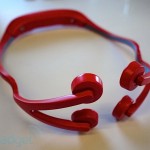 We’ve seen a number of headsets tap into the mind, to geotag your mood , grant you remote control over gadgets or simply let you wiggle a pair of cat ears . None of those are quite like the foc.us, however, which serves up transcranial direct-current simulation (tDCS) — a controversial form of neurosimulation that transmits current to a particular area of the brain. Originally used to help patients with brain injuries, tDCS has supposedly been found to increase cognitive performance in healthy adults. These claims haven’t been proven yet though, and shocking your own cranium isn’t exactly FDA approved. Still, the foc.us is one of a few tDCS headsets designed for the consumer market and can, the inventor Michael Oxley claims, improve your working or short-term memory when the electrodes are placed on your prefrontal cortex. A low-intensity current is passed through the different nodes, exciting that part of the brain. Interestingly, Oxley is positioning it as a way to boost your video gaming prowess for the “ultimate gaming experience,” a concept we found a little odd. That said, you don’t actually have to wear the headset while shooting up bad guys or other brain-draining tasks. The idea behind the foc.us headset is to put it on your noggin, fire it up, and wait for around five to ten minutes, then take it off and go about your day. We did just that and all the gory details are after the break. Gallery: foc.us Filed under: Science Comments Source: foc.us
We’ve seen a number of headsets tap into the mind, to geotag your mood , grant you remote control over gadgets or simply let you wiggle a pair of cat ears . None of those are quite like the foc.us, however, which serves up transcranial direct-current simulation (tDCS) — a controversial form of neurosimulation that transmits current to a particular area of the brain. Originally used to help patients with brain injuries, tDCS has supposedly been found to increase cognitive performance in healthy adults. These claims haven’t been proven yet though, and shocking your own cranium isn’t exactly FDA approved. Still, the foc.us is one of a few tDCS headsets designed for the consumer market and can, the inventor Michael Oxley claims, improve your working or short-term memory when the electrodes are placed on your prefrontal cortex. A low-intensity current is passed through the different nodes, exciting that part of the brain. Interestingly, Oxley is positioning it as a way to boost your video gaming prowess for the “ultimate gaming experience,” a concept we found a little odd. That said, you don’t actually have to wear the headset while shooting up bad guys or other brain-draining tasks. The idea behind the foc.us headset is to put it on your noggin, fire it up, and wait for around five to ten minutes, then take it off and go about your day. We did just that and all the gory details are after the break. Gallery: foc.us Filed under: Science Comments Source: foc.us
Read More:
Foc.us headset claims to shock the brain for better gaming, we go forehead-on






re/ tDCS device,
The fact that you guys “found it odd” only suggests to me that you have yet to do some thorough investigation into the subject of tDCS. My own personal reseach into the studies performed at labs and universities around the world only seems to indicate that tDCS is looking extremely promising as an alternative to the lackluster of coffee and binaural beats. That said, I’d like to see you write another article on the subject,, and for god sake, drop the “shock” terminology from your description. 1-2mA can hardly be called a tingle, let alone a shock.
Checkout Professor Colleen Loo on youtube for the headsup -> http://www.youtube.com/watch?v=-hWy2GTfFiA